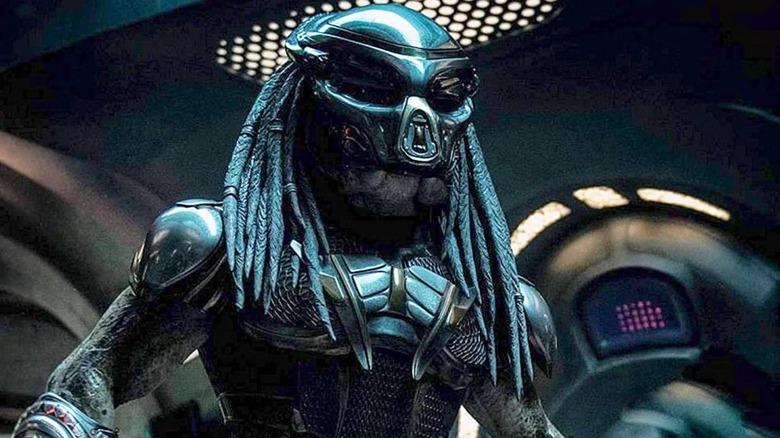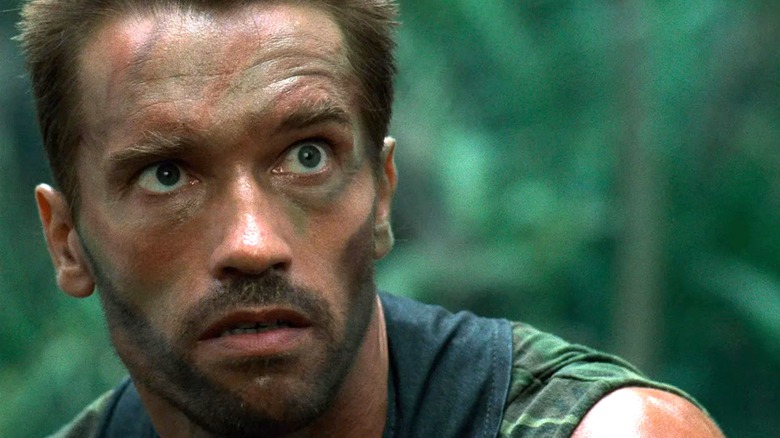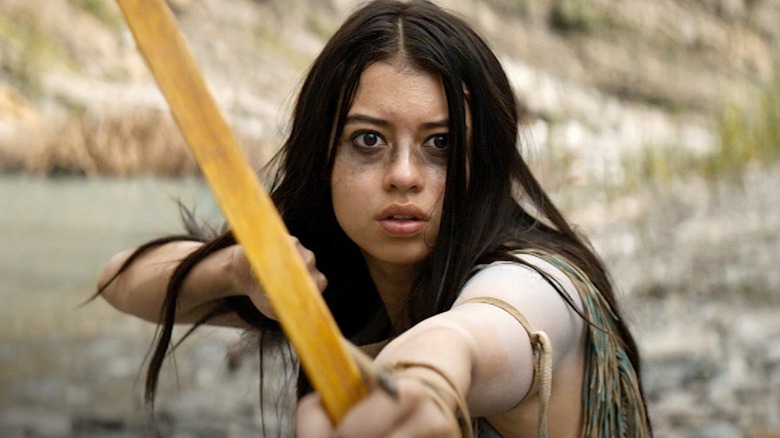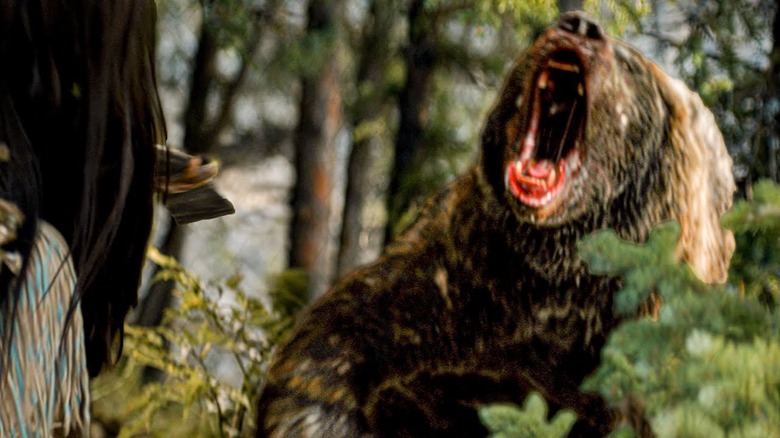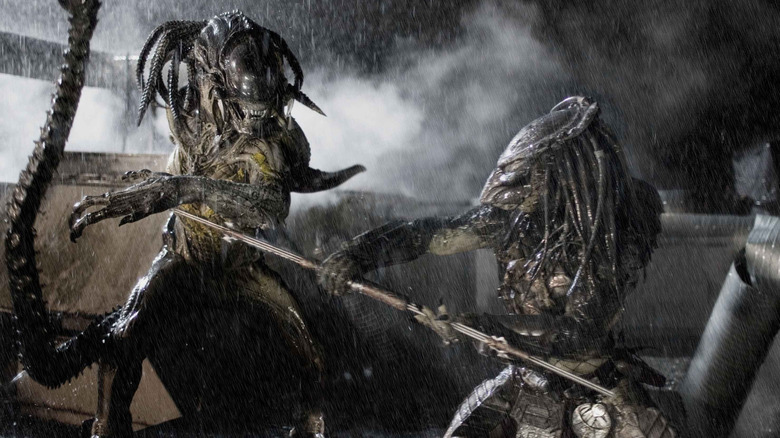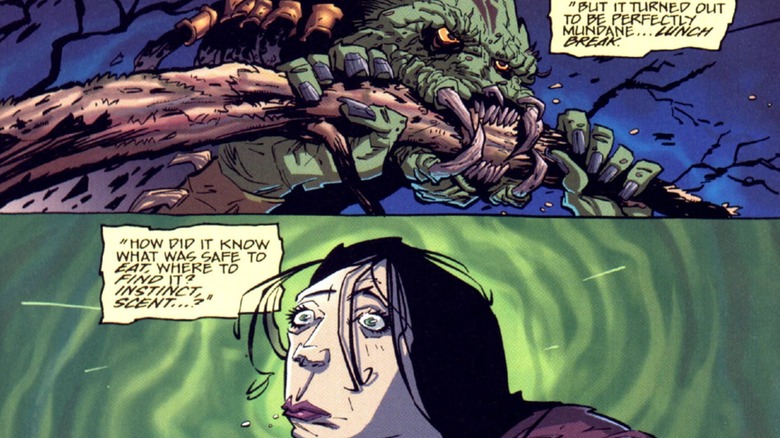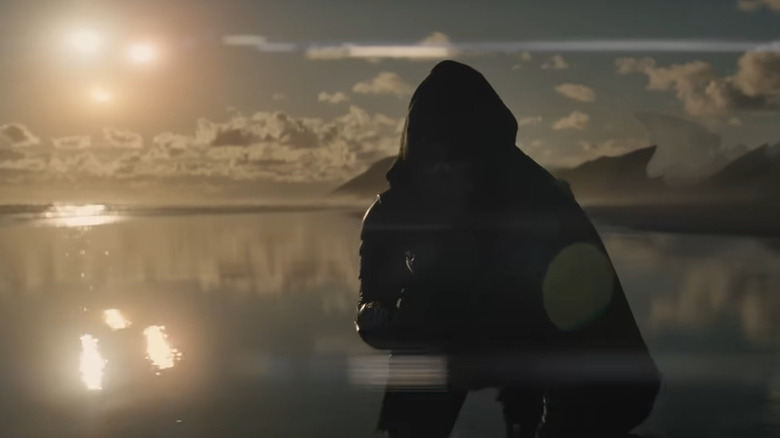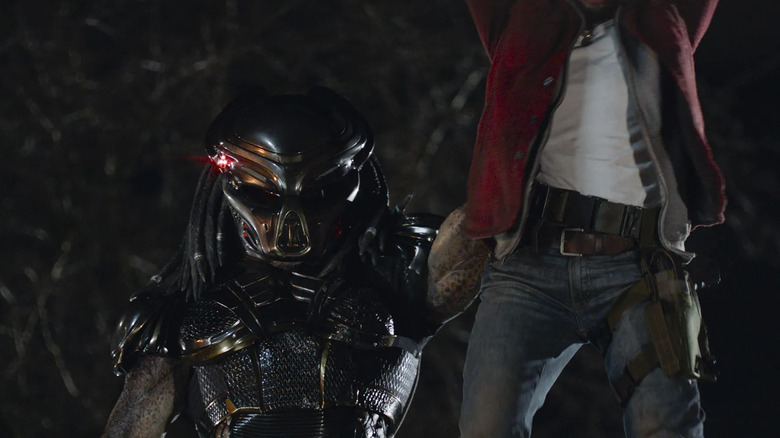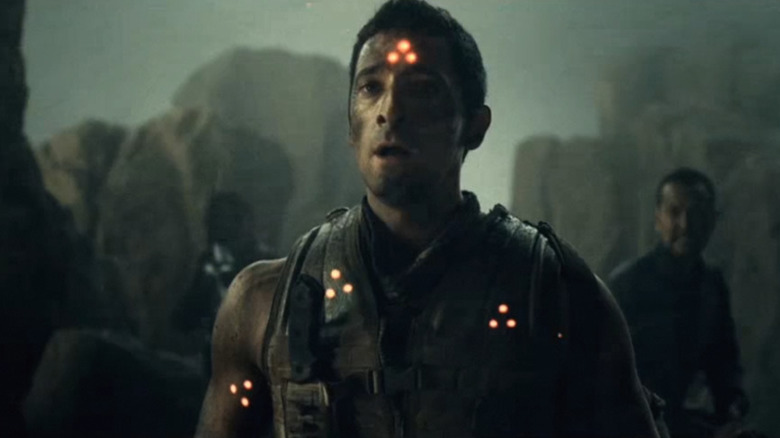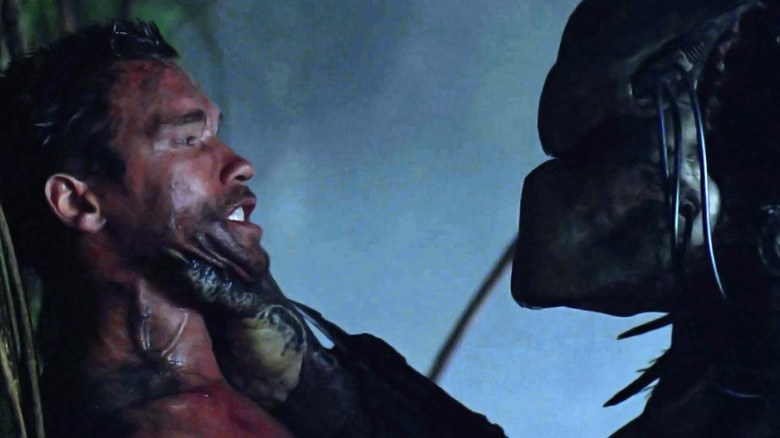The Reason Predators Come To Earth To Hunt
1987's "Predator" sowed the seeds for the titular alien hunter to become one of the most iconic creatures in action-centric horror. Predators — who technically belong to a species called Yautja — have killer designs and have proven their mettle repeatedly throughout the "Predator" story. They have an array of methods to subdue and kill their prey, who are often humans. Of course, with a whole universe out there, there are likely plenty of Yautja going to other planets to find worthy foes. But, over the course of the series, which includes films, comic books, and video games, Predators do appear to travel to Earth quite a lot.
At first glance, it may not even seem to make sense. Surely there are other terrifying alien species out there who would be more challenging for the Yautja. Humans are gooey meat bags that frequently get obliterated by these creatures, even if a few people, like Dutch (Arnold Schwarzenegger) from "Predator" and Naru (Amber Midthunder) from 2022's "Prey," manage to come out on top. If nothing else, wouldn't the Yautja get bored coming back to the same place over and over again just to kill a few new humans? Humans probably don't even make for good trophies, as our skulls look nowhere near as cool as the Xenomorph one from "Predator 2."
Of course, the obvious answer is that if Predators didn't keep coming back to Earth, it'd be a lot harder for this franchise to continue. But if you study the lore, it becomes abundantly clear why the Yautja like coming to Earth. Here's why we're apparently their favorite prey.
Earth has suitable foes for the Predators
There's clearly many different life forms in the galaxy within the "Predator" franchise. There are Yautja, humans, Xenomorphs, and at least a few other alien races given the skulls found on the spaceship in "Predator 2." But Yautja keep coming back for humans, and there's a pretty logical in-universe explanation for this: Humans put up a good fight.
A false fact about the Predator that everyone believes is that they truly are predators, which is a bit of a misnomer. "Predator" implies that they hunt to eat their prey, but Predators don't eat humans. They kill them and take trophies. They seek out the thrill of the chase, and humans offer a level of ingenuity to keep them on their toes. You see this in the first "Predator" movie when the titular monster stalks the paramilitary crew in the jungle. Before attacking them, the Predator studies their movements. It needs to make sure it fully understands what humans are capable of before taking them out one by one.
While the mercenaries have a lot of firepower, it winds up being ingenuity that is the Predator's undoing: Dutch covers himself in mud to cloak himself from the Predator's thermal vision, and it winds up being a trap rather than pure gunfire that kills the Predator. A human probably couldn't take a Yautja in hand-to-hand combat, but our intelligence gives us other advantages, and that's something Predators probably enjoy taking on to see if they can subdue a crafty foe.
Earthlings and their weapons are constantly evolving
1987's "Predator" may be the first movie in the franchise, but it doesn't depict the first time Yautja came to Earth. We know they've appeared throughout the planet's history, notably in 18th century America when "Prey" takes place. And that timeline helps us better understand the reason Predators continue to come to Earth — there's always a new challenge.
The Predator seen in "Prey" goes up against humans with more rudimentary weapons. The French fur trappers have Brown Bess muskets while Naru has a bow and arrow at her disposal. Of course, trickery and ingenuity win the day, but no doubt the Predator had plenty of work cut out for it beforehand. And this suggests that Predators return to Earth because humans are constantly developing new tools and weapons. If the Yautja keep an eye on us, then they know that we have muskets one century and machine guns later. The animated anthology film "Predator: Killer of Killers" takes this a step further by showing Predators visiting Earth at various points in history, including Vikings in the 800s, a ninja in feudal Japan, and fighter pilots during World War II.
Yautja pride themselves on their hunting skills. If they want to prove they're the fiercest warriors in the universe, then they need to know they can handle whatever new weapon humans come up with. It's worth noting that a major difference between "Prey" and other "Predator" movies is that the former's Predator doesn't have as many high-tech gadgets, which suggests that these Yautja aren't quite as technologically advanced as they are by the events of "Predator." Both species could be evolving at comparable rates, so the Yautja might want to see who has the better weaponry.
They can fight different animals in different ways
One thing you might notice in every "Predator" movie is that the Yautja always fight combatants with appropriate force. They're not just killing people sitting at home on the couch; they're going up against hardened warriors with weapons who actively engage in a fight. And Predators never really seem to use more force than is necessary. While they have guns and could easily snipe all of their victims with ease, they often take a dignified approach to their battles. For instance, in "Prey," the Predator battles a bear with its hands alone, foregoing any weapons.
Of course, Yautja can also fight humans with their bare hands, as is the case in the final fight in "Predator." But throughout the film, the Predator also uses wrist blades, a spear-gun, explosives, and a plasma caster. A plasma caster might be overkill on a bear, but when your opponent is a team of mercenaries, suddenly it becomes a viable option.
Humans are craftier than bears, and we can assume that we're also craftier than most of the alien species that the Predators have locked horns with, because they keep coming to fight us again and again. Humans have weapons and defensive techniques that force Yautja to consider what weapon would be best for a given scenario. At the end of the day, killing humans might be the most fun most Predators ever have.
It also gives them the chance to face Xenomorphs
The "Alien vs. Predator" movies add many confusing moments to the "Alien" movie franchise. For instance, Xenomorphs have apparently been on Earth for a long time, and if we're to assume those films are canon, then there's another layer as to why Predators show up on Earth regularly. 2004's "Alien vs. Predator" establishes that the Yautja partake in a rite of passage once a century where they sacrifice humans to the Xenomorphs living within the planet's depths. The Predators then hunt the Xenomorphs since they're the perfect organisms. Xenomorphs, with acid blood and a tail with a sharp blade on the tip, make for worthy adversaries. In these movies, humans are almost incidental. To a Predator, a Xenomorph skull is likely among the most valuable things you can have on your mantle.
The chances of getting "Alien vs. Predator 3" are low, but the duology does provide plenty of lore to draw from. As far as the various instances where Predators go after humans instead of Xenomorphs, perhaps they view it as target practice. What's most interesting about "Alien vs. Predator" is how Predators kind of respect humans. When a spaceship arrives to pick up the fallen, one of the Yautja gifts final girl Lex (Sanaa Lathan) a spear as a sign of appreciation for her efforts. Predators aren't mindless killing machines, and they view humans as necessary cogs in their own missions to prove their dominance. And when a human proves they're strong as well, they don't mind showing respect.
Predators might be from Earth originally
Similarly to "Alien vs. Predator," it's unclear if fans should consider the comic book miniseries "Predator: Homeworld" from Jim Vance, Kate Worley, Toby Cypress, and Mark Lipka to be canon; however, it does provide another unique perspective into why Predators frequently visit Earth. In Issue #3, naturalist Maya Bergstrom, lacking any weapons, is able to follow a Predator on Earth to observe its behavior. She witnesses it digging up a root and eating it, and she wonders how it knew where to find a food source and that it was edible in the first place. She hypothesizes that Yautja originated on Earth, meaning the reason they frequently come back is as a form of pilgrimage.
Maya notes in the comic, "There are so many gaps on the evolutionary chart. Creatures that apparently disappeared virtually overnight." It's completely possible that Maya's theory is entirely inaccurate, but if we take it at face value, then humans and Yautja could share a common ancestor. Perhaps these Predators escaped Earth at some point and established their own colony elsewhere. It would explain why humans and Yautja share similar attributes, like how we're both bipedal and proficient with tools.
Predators might be drawn to Earth simply because it's where their evolutionary line began. Some Predators may even visit the planet as a form of vacation, just wanting to see where their ancestors came from. After all, if they didn't engage anyone in combat, then we'd never know they were here. As far as fighting humans over millennia, perhaps the Yautja want to prove to themselves that deviating from humanity's evolutionary line was worth it. They became smarter and stronger on their own, and killing hordes of humans is a way to show they're the top fighters in the universe.
The climate makes Earth hospitable for Predators
Since Predators have mastered interplanetary travel, it's safe to say they can visit a lot of planets and not just Earth. However, that doesn't mean it's necessarily feasible to go to every planet out there. We've seen glimpses of the Predator homeworld, Yautja Prime, in various media, including in the comics and in "Alien vs. Predator: Requiem." It also appears as though "Predator: Badlands" will have some scenes on Yautja Prime, as the trailer features a scene of a character wading in water with three suns in the distance. Between this and the desert landscape seen in the comics, it's probably safe to assume Yautja Prime gets very hot, so it's possible the Predators can only survive on planets that are similarly warm.
Many "Predator" films see the Yautja travel to the warmest parts of Earth. "Predator" takes place in a hot, humid jungle. The beginning of "Predator 2" notes how Los Angeles is in the midst of a heat wave. Granted, "Alien vs. Predator" sees the Yautja go to Antarctica, so they're clearly not beholden solely to warmth, though perhaps they prefer it. Either way, they can survive and thrive in Earth's climate. Even though Predators normally wear helmets for much of the runtime of these movies, they can remove them and face their enemies. That means they can function on Earth without needing another breathing apparatus, which is probably another contributing factor to why it's such an attractive option for hunting game regularly.
Humanity could hold the key for the next stage of Predator evolution
One of the worst things about 2018's "The Predator" is how downright offensive it gets in its portrayal of autism. Shane Black's movie presents autism as the next stage of human evolution, which experts agree isn't the case. In the film, a Predator comes to Earth to kidnap Rory (Jacob Tremblay), who is autistic. The scientists believe that they're doing this in order to blend their DNA with Rory's, hybridizing themselves and advancing their own species in the process.
Portraying people with Autism Spectrum Disorder as having some kind of superpower is wildly inaccurate, as developmental psychologist Sue Fletcher-Watson told SyFy Wire. "Autistic people genetically are indistinguishable from non-autistic people," she said. "There may be a combination of genes that confer higher likelihood of autism, but we're not yet confident about what that genetic combination is." In the "Predator" universe, the Yautja are clearly confident that it's beneficial for them to have whatever that combination of genes is. This tells us that Predators come to Earth in part to enhance their abilities and evolve their species.
Who knows how many humans Predators have killed?
It makes sense that casual viewers would wonder why Predators keep coming back to Earth. Every movie sees humans killing Predators, so after a while, you have to wonder at what point the Yautja realize Earth just isn't worth coming to anymore. However, that thought process ignores how truly skilled these Predators are. And if they've been coming to Earth for centuries, there are undoubtedly countless stories of Predators arriving on Earth, killing a bunch of humans, and flying away with their trophies.
For most Predators, coming to Earth is probably a fruitful endeavor. We only see the stories where humans win in the end because that's what makes for the most compelling narrative for us. Whenever a human kills a Predator, it makes us more of a worthy adversary. Plus, if Predators really want to even the playing field, they can always kidnap a bunch of humans and put them in a game preserve like in 2010's "Predators."
Yautja culture emphasizes survival of the fittest. If one of them dies in battle, they at least received a glorious death at the hands of a noble warrior. Predators don't fear death, and in the 1994 novel "Aliens vs. Predator: Prey," we hear about the Black Warrior, the Yautja's manifestation of death. It guides them to the afterlife, so dying allows Predators to reconnect with the greatest adversary of all. Perhaps the simplest explanation of why Predators keep coming back to Earth to hunt is because either winning trophies or dying valiantly is winning in their minds.
One fan theory suggests Earth is for loser Predators
There's plenty to pull from the "Predator" movies as far as understanding why these aliens constantly show up on Earth, but it's still fun to see what fan theories viewers come up with to explain their presence. Redditor u/wonderfool points out how the Yautja really shouldn't have any issue taking down humans. After all, they've mastered interstellar travel and clearly have more violent technology that should make killing humans a breeze, like the plasma caster. Yet, we've seen multiple instances now of humans handily beating Predators, which u/wonderfool tries to explain: "Many of the arguments that the 'Predator' films are unrealistic can be resolved if we consider Earth to be one of the places where the aliens send their worst cadets/students for a last-chance attempt to make the grade."
It's pretty funny to think that Dutch, Naru, and all the other humans who have beat a Predator up to this point were basically taking out Yautja Prime's losers. In this scenario, these are the F-grade students who just need a single win to pass the class, so they go to a planet with a bunch of weak meat bags they should have no problem taking out.
If this theory holds water, it makes the universe all the more terrifying, because it means there are stronger Predators out there who may get tired of humans racking up so many wins against their kind and come to settle the score. The only problem with this theory is that the Predators we see really aren't losers. In 1987's "Predator," the Yautja kills six commandos and probably a bunch of others during its time on Earth. At the end of the day, Dutch got lucky.
